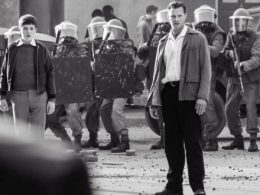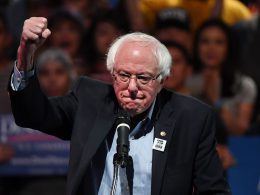By Michael O’Brien
The struggle of the former Debenhams workers employed in its then 11 stores in this State was sparked off in the early stages of the Covid pandemic when the 2,000 directly and indirectly employed workers were informed by email that their jobs were gone with immediate effect.
While the very reason for the job losses was contested by many of the workers and the Socialist Party, the key focus in the fight that ultimately unfolded was forcing the liquidator KPMG to honour a commitment made by Debenhams employers in 2016 that any future redundancies would see affected workers receiving four weeks pay per year’s service redundancy. This four weeks was to be made up of the two weeks’ statutory minimum and a further two weeks of an enhancement beyond that.
Shortly after the conclusion of the 406-day struggle in May 2021, I wrote:
“It can take the passage of time, years in fact, to have a sense of a particular strike’s place in history. Among trade unionists, socialists, activists, and sometimes the wider working class, disputes such as the six-month-long strike of An Post workers in 1979, the Clondalkin Paper Mill occupation in 1983, and the Dunnes Stores Anti-Apartheid Strike of the mid-eighties survive to this day as historical reference points of hard-fought struggles, some victorious others not.
“It is already clear that the Debenhams strike will likewise survive for years to come in the folk memory of the working class in this country. The commitment of hundreds of predominantly women workers across the 11 stores to sustain a struggle for over a year in the context of a lockdown, deploying many tactics in the process — pickets, marches, occupations, rallies — adapting to the Covid restrictions and keeping the issues firmly in the news and on political agenda is nothing short of remarkable and deserves to be celebrated.”
The recently released documentary “406 Days”, above all else, is precisely a celebration of that struggle. It featured in the recent Dublin International Film Festival and won awards for the best documentary, the Irish Council of Civil Liberties’ Human Rights’ Film Award and the viewers’ award.
To a huge extent, the documentary is driven by the former Debenhams workers themselves with the participants in Henry Street, Waterford, Tralee, Tallaght and the two Cork stores particularly featuring in talking through every stage of events and all the tactics that were employed to sustain the fight including store occupations. This is supplemented by contemporary media coverage and what was captured on camera by workers and their supporters on the picket lines and protests including Blanchardstown, Limerick, Newbridge, Galway and Blackrock which at various stages were the scenes of high-stakes standoffs with trucks intending to remove stock, backed by the Gardaí and court orders.
The particular callousness in which the job losses were communicated, the cynical manner in which full advantage was taken of the lockdown conditions by the company and step by step the overwhelmingly female workforce picking themselves up and getting organised to guard the stock in the stores which were correctly identified as key leverage and also wage a campaign targeting the government to intervene to ensure the commitment made to pay the workers enhanced redundancy of four weeks pay per year’s service was honoured all dramatically unfolds over an hour and a half.
The documentary will no doubt be inspiring for any worker who watches it. There is great merit in putting the former workers centre stage in the telling of the story from start to end. The role of the State in the form of the Garda and courts in backing the liquidator and attempting to curtail the struggle features strongly and in fact, comes across as decisive in ultimately bringing the struggle to a conclusion.
A lingering concern that stuck with me after watching the documentary was viewers who do not have all the background knowledge and context of what happened drawing an unbalanced conclusion that while this was a heroic struggle (which it was) it was one that was always destined to end the way it did thanks to the sheer force of the State that was applied at the end.
The concluding points put up on the screen before the credits rolled at the end included that only €250,000 of the €3 million training fund made available to the workers as part of the settlement of the dispute has since been drawn down. The deadline for accessing this fund is October this year. This fact further underlines the point that the workers did not get the reward they deserved for their titanic struggle and again without some wider context and analysis this could lead a viewer to the wrong conclusion that that was inevitably the case.
If a constructive criticism was to be made of what is generally a well put together documentary it is that the alternative possible outcomes of the struggle were not explored to any significant degree. To have done so would have required a much fuller account and explanation of the negative role of Mandate the union and wider trade union officialdom who did not do anything near enough to put the government under pressure in the course of the dispute.
Likewise, the documentary would have benefited from more information about the lack of ‘business’ justification for the job losses. Among the workers themselves there was significant expertise on these matters that equipped the various Dáil deputies from the left (the only political forces who meaningfully supported the workers) in bringing addressing points directly to the government.
Inevitably, every aspect of this 13-month-long struggle cannot be squeezed into 90 minutes and in particular, the culpability of the government, who failed to act after the Clery’s precedent is not fully gone into.
For that reason, while actively encouraging every worker to see this documentary and to be inspired by the resolve and spirit of the Debenhams workers we would also encourage people to delve into some of the background history of the organising of the struggle, in which Socialist Party reps and Ruth Coppinger in particular, played a particularly distinguished role in hosting the essential Zoom discussions among shop stewards, activists and supporters. That particular account, written only four months into the strike also takes up the argument that the redundancies themselves were not inevitable.
Likewise, we would encourage viewers to get a deeper analysis of the role of the trade union officials and the change that is still required in the trade union movement to ensure that we have the occasion to celebrate more struggles like that of the Debenhams workers but also learn all the necessary lessons to equip ourselves for future struggles so that we can celebrate victories.
There remains some unfinished business arising from the Debenhams’ struggle. The WRC is still hearing a complaint from the workers about a range of issues including the non-observance of the obligatory consultation period for redundancies on the part of KPMG, which, if upheld, would result in a maximum fine of €250,000.
Likewise, the ‘Debenham’s Bill’ moved by Socialist Party TD Mick Barry which seeks to prioritise workers over other creditors in liquidation situations is still on the Oireachtas agenda at Committee stage and will continue to be fought for.
The documentary deserves to get the widest possible viewing. At the time of writing it is due for a showing in UCC on Monday 13th March and the producer is actively seeking opportunities for other showings and festival entries as well as a general cinema release. The workers and their heroic struggle needs the biggest audience possible.












